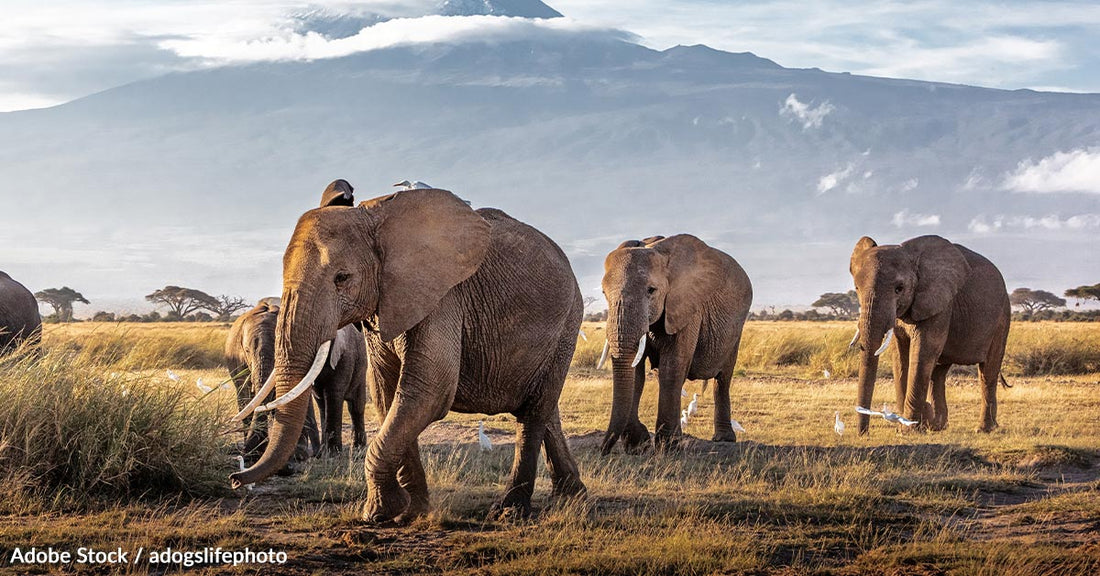7th Annual Holiday Toy & Book Event Help make the holidays brighter this year!
Trophy Hunting Contributes to The Plight Of Threatened African Elephants And Could Soon Drive Them Extinct
Matthew Russell
African elephants are majestic creatures that have roamed the continent for millions of years. Unfortunately, their existence is now threatened due to human activities such as poaching, habitat loss, and trophy hunting, the World Wildlife Fund reports. Despite efforts to conserve and protect these magnificent animals, the United States continues to import trophies from African elephant hunts, according to the New York Times, which only adds to the species' woes.
Between 2005 and 2014, nearly 4,000 elephant trophies were imported into the United States, National Geographic reports. These include tusks, heads, and other body parts of elephants killed in Africa. According to the Humane Society Legislative Fund, the US is the largest market for elephant trophies, and American hunters have been responsible for killing at least 2,500 African elephants in the past decade. Despite calls to ban the importation of elephant trophies, the US government continues to allow the practice under certain conditions.
 Photo: Adobe Stock / ondrejprosicky
Photo: Adobe Stock / ondrejprosickyAfrican elephants are threatened by human activities like poaching, habitat loss, and trophy hunting.
Trophy hunting, which is the practice of killing wild animals for sport, has long been controversial. Supporters argue that it generates revenue for local communities and contributes to conservation efforts, reports Born Free USA. However, opponents argue that it is cruel, unsustainable, and undermines conservation efforts by removing animals from the gene pool. In the case of elephants, trophy hunting can have disastrous effects on their populations, which are already under threat due to poaching and habitat loss, Brookings reports.
Elephants are social animals that live in large herds and are critical to the health of their ecosystems. According to myanimals, they play a vital role in seed dispersal, maintain open landscapes, and create water sources for other animals. Losing elephants could have far-reaching consequences for African wildlife and ecosystems.
 Photo: Adobe Stock / Anna
Photo: Adobe Stock / AnnaThe US is the largest market for elephant trophies, and American hunters have killed at least 2,500 African elephants in the past decade.
Moreover, African elephant populations have decreased dramatically in recent years. According to the International Union for Conservation of Nature (IUCN), African elephant populations have declined by 30% over the past decade due to habitat loss, poaching, and other factors. This decline is expected to continue unless more significant measures are taken to protect these animals.
Given these factors, it is clear that the US must take a more significant stance in protecting African elephants. One way to do this is to ban the importation of elephant trophies altogether. By doing so, the US can send a clear message that it is committed to protecting these animals and their habitats.
 Photo: Adobe Stock / donvanstaden
Photo: Adobe Stock / donvanstadenElephants are social animals that play a vital role in maintaining the health of their ecosystems.
The U.S. Fish and Wildlife Service recently restricted the import of wildlife trophies, but after a hunting group sued, the agency is now reconsidering the decision, and may allow hunters to ship elephant heads, tusks, feet and other trophies from Zimbabwe and Namibia back to the U.S.
It is clear that allowing the killing of rare and threatened wildlife will only accelerate the extinction crisis. This is why the Center for Biological Diversity and other organizations are calling on the federal government to end those imports once and for all, by banning them under the Endangered Species Act. Additionally, the US government can work with African countries to create sustainable conservation programs that do not rely on trophy hunting for revenue.
 Photo: Adobe Stock / johanelzenga
Photo: Adobe Stock / johanelzenga>Help us speak out against trophy hunting, and advocate for stronger regulations to protect African elephants.
It is up to all of us to help protect African elephants and other wildlife. We can do this by supporting organizations that work towards conservation efforts, speaking out against trophy hunting and advocating for stronger regulations to protect these magnificent animals. African elephants are not only a vital part of African ecosystems, but they are also a symbol of strength and resilience. It is up to us to ensure that they continue to roam the African savanna for generations to come.
Sign the petition and save African elephants from extinction!

